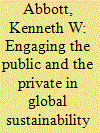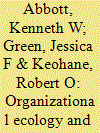|
|
|
Sort Order |
|
|
|
Items / Page
|
|
|
|
|
|
|
| Srl | Item |
| 1 |
ID:
112804


|
|
|
|
|
| Publication |
2012.
|
| Summary/Abstract |
Negotiators preparing for Rio+20 are missing an important opportunity. Private sustainability governance (PSG) is thriving: organizations created by business and civil society groups, as well as public-private partnerships, adopt and apply significant regulatory standards and undertake valuable operational activities, including pilot projects and financing. However, even though reforming the institutional framework for sustainable development is a central part of the Rio+20 agenda, negotiators are focusing almost exclusively on inter-governmental organizations such as the UN Environment Program (UNEP), the Commission for Sustainable Development and the Economic and Social Council. This public-private engagement gap isolates international governance from the energy and innovation of PSG, and impedes efforts to coordinate the bifurcated and decentralized system of sustainability governance. This article argues that states, and especially international organizations, should actively support PSG as part of the institutional framework for sustainable development, while steering private and public-private schemes towards good organizational practices and the pursuit of public goals. Engagement with PSG would help international institutions pursue their sustainability missions more effectively, promote the emergence of effective and legitimate private schemes, manage fragmentation, promote experimentation and learning, and enhance citizen participation. The article outlines two fruitful modes of engagement pioneered by UNEP: regulatory cooperation, in which international authorities engage directly with business firms, industry groups and other 'targets', influencing them to adopt more sustainable behaviors; and orchestration, in which authorities engage with intermediary organizations, such as multi-stakeholder private governance schemes, catalyzing, supporting and steering them as they seek to influence the ultimate targets of policy.
|
|
|
|
|
|
|
|
|
|
|
|
|
|
|
|
| 2 |
ID:
147079


|
|
|
|
|
| Summary/Abstract |
The institutions of global governance have changed dramatically in recent years. New organizational forms—including informal institutions, transgovernmental networks, and private transnational regulatory organizations (PTROs)—have expanded rapidly, while the growth of formal intergovernmental organizations has slowed. Organizational ecology provides an insightful framework for understanding these changing patterns of growth. Organizational ecology is primarily a structural theory, emphasizing the influence of institutional environments, especially their organizational density and resource availability, on organizational behavior and viability. To demonstrate the explanatory value of organizational ecology, we analyze the proliferation of PTROs compared with the relative stasis of intergovernmental organizations (IGOs). Continued growth of IGOs is constrained by crowding in their dense institutional environment, but PTROs benefit from organizational flexibility and low entry costs, which allow them to enter “niches” with limited resource competition. We probe the plausibility of our analysis by examining contemporary climate governance.
|
|
|
|
|
|
|
|
|
|
|
|
|
|
|
|
|
|
|
|
|